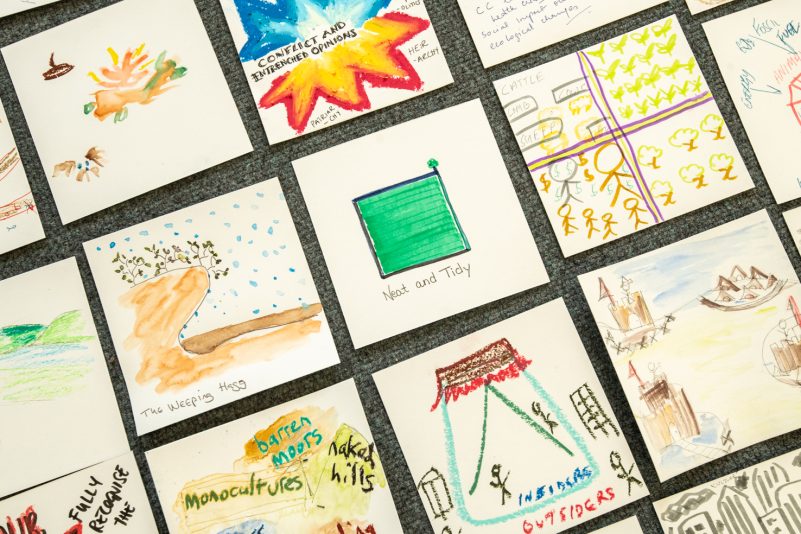Poetry at a Conference: welcoming heart and head, nuances and surprise

The Resonance: Uplands and Protected Landscapes Big Tent event approached land use change through a transdisciplinary framework which combined site visits, shared meals and a conference which combined technical discussions and art interventions. This transdisciplinary approach was epitomised by Harriet Fraser, co-founder of the Place Collective, opening the second day of the conference with a poem, which was an invitation, and a signal that heart and head are both needed, and welcomed, in the conversations held at the event.
(untitled)
we are in the hinterland between stories
what we look back to, what comes next
throw back throw forward
let me throw some words at you: climate, net zero, data
try these: function, statistics, carbon
or these: rain, hope, food, love
and of course, there are sounds that defy the reach of words …
wind in the leaves of an ash tree
water over rock
a suckling calf
the beat of your heart
yet we are too often led by words on pages
and here we are to talk of land use
ask
ask not what the land can do for us but
ask, ask questions that come from the pit of your belly
or force tears to your eyes
and ask how
how we might map our place
and map our forward pace
listen
what is that sound?
silence?
your thoughts about another’s thoughts?
a bird?
your own penny dropping?
are we each of us islands
waiting for a sea change?
or are we all entwined in life
this life that might seem like a miracle, a wonder
this life that might seem like a miracle, squandered
where is the wisdom we need?
imagine what’s in the spaces
in between what’s felt and heard, measured and seen
where energy flows
where impulse grows or fades
so that a system thrives or fails
we are in the hinterland between stories
what we look back to, what comes next
throw back throw forward
be mindful what gets thrown away
and carry seeds with care
Harriet Fraser, March 2025
Here are some thoughts on the inclusion of poetry in the Resonance: Uplands and Protected Landscapes Big Tent event shared by Harriet in her blog on the Somewhere Nowhere webpage.
Why poetry?
At an event like this, everybody comes with a professional perspective, but we all are human; poetry can go some way to bringing the ‘job’ and the ‘life’ together. Poetry, spoken, has a melody, and contains pauses – important pauses that allow each person’s response to surface. A poem can provoke, surprise, and perhaps startle: and may prompt a greater receptivity. For some people, it grants permission to express things more openly, and to provide more space for others to do the same.
A poem – and the poet delivering the poem – are able to step outside normative structures such as bullet points, presentations, graphs. There is room for uncertainty, nuance, depth, individuality and universality; poetry can use the language of academia, of policy, of science, and of sensual and emotional experiences, and mix them up. All of these things matter, and none exists in isolation.
Finding the content
The content of this poem emerged following a series of conversations and observations around the topics being explored, including land use, evidence collection, resilience to climate change, catalysts for and barriers to action, and motivations to collaborate. My process draws on what I learn in webinars, during face-to-face meetings in fields, on riverbanks, on farms and in conference rooms, and from relevant papers.
The event, as context
This event posed questions about scaling up and replicating change, in the context of land management for ‘net zero’ and the social and environmental benefits that go with this. It was one of a number of UK LUNZ Hub ‘Big Tent’ events and took place over two days; with the first day spent in Ullswater Valley learning about significant land use and landscape changes, and the second following a more traditional conference style, at the Centre for National Parks and Protected Areas, at Cumbria University. The framework was not solutions-focused; rather it was designed to encourage conversations and the sharing of insights. People spent time together exploring possibilities, being honest about opportunities and challenges, allowing hope as well as concern. The poem was composed to give a foundation for this process – and at the end of the day I closed with a short section of the same poem: a parenthesis around the journey of thought, discussions and experiences, and two opportunities for pause before heading away into the next task
Subscribe to our Newsletter
A quarterly update of all LUNZ Hub activities, events and news stories.
